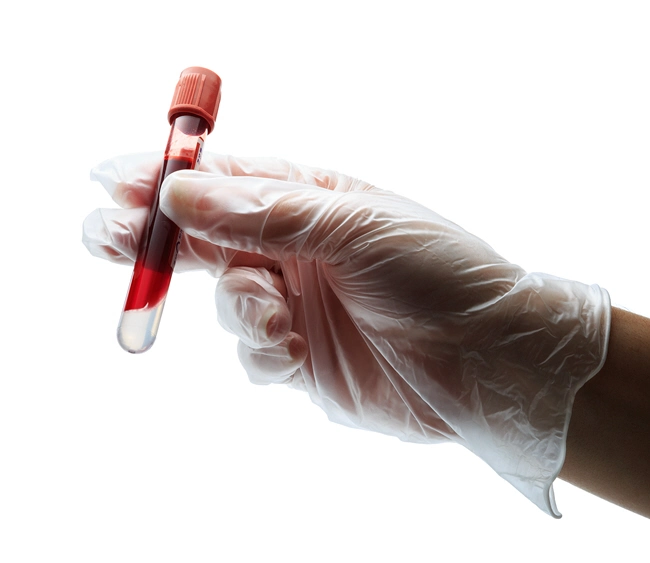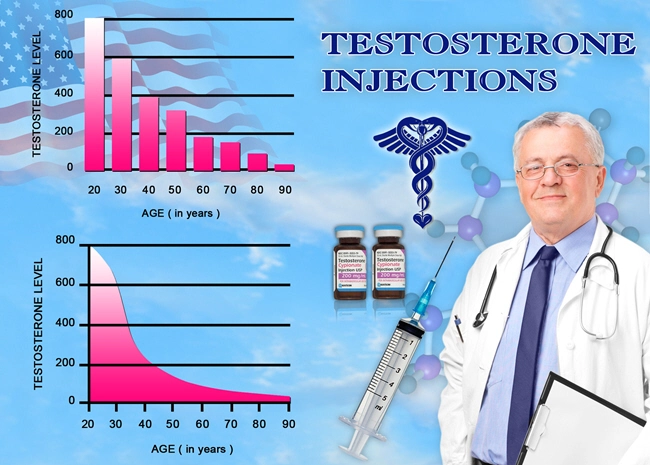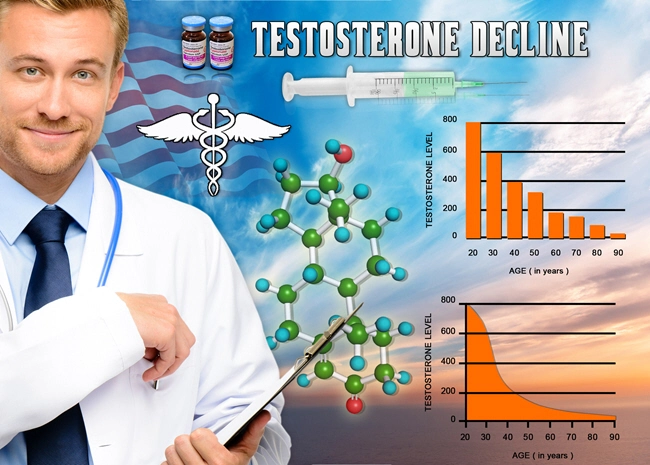
Introduction
Testosterone deficiency syndrome (TDS), also known as hypogonadism, is a clinical condition characterized by low levels of testosterone and associated symptoms such as decreased libido, fatigue, and mood disturbances. In recent years, the prevalence of TDS has been on the rise, paralleling the increasing rates of obesity in the American male population. This article delves into a longitudinal study that explores the causal relationships between testosterone deficiency and obesity, shedding light on the complex interplay between these two health concerns.
The Longitudinal Study Design
The study in question followed a cohort of 1,500 American males aged 30 to 70 over a period of 10 years. Participants were assessed annually for testosterone levels, body mass index (BMI), and other relevant health parameters. The study aimed to determine whether obesity predisposes individuals to TDS or if TDS contributes to the development of obesity.
Findings on Obesity as a Precursor to TDS
The data revealed a significant correlation between increasing BMI and declining testosterone levels. Men who were obese at the study's outset showed a more rapid decline in testosterone compared to their non-obese counterparts. This suggests that obesity may act as a precursor to TDS. The proposed mechanisms include increased aromatase activity in adipose tissue, which converts testosterone to estradiol, and the inflammatory state associated with obesity, which can impair testicular function.
TDS as a Contributor to Obesity
Conversely, the study also found that men who developed TDS during the study period were more likely to gain weight and become obese. This finding supports the hypothesis that TDS can contribute to obesity. Low testosterone levels are known to affect muscle mass and metabolism, potentially leading to increased fat accumulation. Additionally, symptoms of TDS such as fatigue and reduced physical activity may further exacerbate weight gain.
The Bidirectional Relationship
The longitudinal study's most compelling finding was the evidence of a bidirectional relationship between TDS and obesity. This suggests a vicious cycle where obesity leads to TDS, which in turn worsens obesity. This cycle underscores the importance of addressing both conditions simultaneously to break the feedback loop and improve overall health outcomes.
Implications for Clinical Practice
The study's findings have significant implications for the clinical management of American males with TDS and obesity. Healthcare providers should consider screening for TDS in obese patients and vice versa. Lifestyle interventions, such as diet and exercise, should be emphasized as first-line treatments, given their potential to address both conditions. In cases where lifestyle changes are insufficient, testosterone replacement therapy may be considered, but its use should be carefully monitored due to potential side effects and the need to manage obesity concurrently.
Future Research Directions
While the study provides valuable insights into the causal relationships between TDS and obesity, further research is needed to elucidate the underlying mechanisms and to develop targeted interventions. Future studies should explore genetic factors, the role of diet and specific nutrients, and the impact of different exercise modalities on both TDS and obesity.
Conclusion
The longitudinal study on testosterone deficiency syndrome and its association with obesity in American males highlights the complex and bidirectional nature of these conditions. By understanding the causal links between TDS and obesity, healthcare providers can better tailor interventions to improve the health and well-being of their male patients. As the prevalence of both conditions continues to rise, it is imperative that research and clinical practice evolve to address this growing public health challenge.
Contact Us Today For A Free Consultation
Dear Patient,
Once you have completing the above contact form, for security purposes and confirmation, please confirm your information by calling us.
Please call now: 1-800-380-5339.
Welcoming You To Our Clinic, Professor Tom Henderson.

- Testosterone Deficiency in American Men: Symptoms, Diagnosis, and Holistic Management [Last Updated On: March 15th, 2025] [Originally Added On: March 15th, 2025]
- Managing Testosterone Deficiency in Aging American Men: Symptoms, Diagnosis, and Treatment [Last Updated On: March 18th, 2025] [Originally Added On: March 18th, 2025]
- Alcohol's Impact on Testosterone and Risk of Deficiency Syndrome in American Males [Last Updated On: March 19th, 2025] [Originally Added On: March 19th, 2025]
- Testosterone Deficiency Syndrome: Symptoms, Importance of Regular Check-ups, and Treatment Benefits [Last Updated On: March 19th, 2025] [Originally Added On: March 19th, 2025]
- Testosterone Deficiency in American Men: Symptoms, Diagnosis, and Energy Impact [Last Updated On: March 19th, 2025] [Originally Added On: March 19th, 2025]
- Stress and Testosterone Deficiency: Mechanisms, Evidence, and Management Strategies [Last Updated On: March 19th, 2025] [Originally Added On: March 19th, 2025]
- Testosterone Deficiency Syndrome: Symptoms, Diagnosis, and Hormone Therapy Benefits [Last Updated On: March 20th, 2025] [Originally Added On: March 20th, 2025]
- Testosterone Deficiency Syndrome: Impacts on Muscle Mass and Health in American Men [Last Updated On: March 20th, 2025] [Originally Added On: March 20th, 2025]
- Environmental Toxins and Testosterone Deficiency in American Males: Public Health Implications [Last Updated On: March 21st, 2025] [Originally Added On: March 21st, 2025]
- Testosterone Deficiency Syndrome: Impacts, Management, and Prostate Health Considerations [Last Updated On: March 21st, 2025] [Originally Added On: March 21st, 2025]
- Testosterone Deficiency Syndrome: Impacts on Skin Health and Management Strategies for American Men [Last Updated On: March 21st, 2025] [Originally Added On: March 21st, 2025]
- Smoking's Impact on Testosterone Deficiency in American Males: Risks and Management [Last Updated On: March 22nd, 2025] [Originally Added On: March 22nd, 2025]
- Testosterone Deficiency Syndrome: Impacts and Management of Joint Health in American Males [Last Updated On: March 22nd, 2025] [Originally Added On: March 22nd, 2025]
- Zinc's Vital Role in Treating Testosterone Deficiency Syndrome in American Men [Last Updated On: March 22nd, 2025] [Originally Added On: March 22nd, 2025]
- Testosterone Deficiency and Mood Disorders: Insights and Management for American Men [Last Updated On: March 22nd, 2025] [Originally Added On: March 22nd, 2025]
- High-Fat Diets and Testosterone: Impacts and Dietary Recommendations for American Males [Last Updated On: March 22nd, 2025] [Originally Added On: March 22nd, 2025]
- Testosterone Deficiency in American Men: Impacts on Cognitive Function and Health Strategies [Last Updated On: March 23rd, 2025] [Originally Added On: March 23rd, 2025]
- Diet Soda's Impact on Testosterone Levels in American Men with TDS [Last Updated On: March 23rd, 2025] [Originally Added On: March 23rd, 2025]
- Weight Training Benefits for Men with Testosterone Deficiency Syndrome [Last Updated On: March 23rd, 2025] [Originally Added On: March 23rd, 2025]
- Testosterone Deficiency and Depression: Understanding the Link in American Men [Last Updated On: March 23rd, 2025] [Originally Added On: March 23rd, 2025]
- Testosterone Deficiency Linked to Hearing Loss in American Males: Insights and Management [Last Updated On: March 23rd, 2025] [Originally Added On: March 23rd, 2025]
- Vitamin D's Role in Managing Testosterone Deficiency in American Males [Last Updated On: March 24th, 2025] [Originally Added On: March 24th, 2025]
- Testosterone Deficiency Syndrome: Impact on Libido and Health in American Men [Last Updated On: March 24th, 2025] [Originally Added On: March 24th, 2025]
- Testosterone Deficiency and Sleep Apnea: Interconnected Health Risks in American Males [Last Updated On: March 24th, 2025] [Originally Added On: March 24th, 2025]
- Testosterone Deficiency and Anemia: Understanding the Link and Treatment Options for American Males [Last Updated On: March 24th, 2025] [Originally Added On: March 24th, 2025]
- Testosterone Deficiency Impacts Body Composition in American Males: Health Implications [Last Updated On: March 25th, 2025] [Originally Added On: March 25th, 2025]
- Magnesium's Role in Managing Testosterone Deficiency in American Males [Last Updated On: March 25th, 2025] [Originally Added On: March 25th, 2025]
- Testosterone Deficiency Syndrome: Understanding Its Link to Hair Loss in American Men [Last Updated On: March 25th, 2025] [Originally Added On: March 25th, 2025]
- Chronic Illness and Testosterone Deficiency: Impacts and Management Strategies for American Males [Last Updated On: March 25th, 2025] [Originally Added On: March 25th, 2025]
- Testosterone Deficiency Syndrome: Impacts and Management in American Athletes [Last Updated On: March 26th, 2025] [Originally Added On: March 26th, 2025]
- Testosterone Deficiency in Men: Impacts on Vision and Eye Health [Last Updated On: March 26th, 2025] [Originally Added On: March 26th, 2025]
- Testosterone Deficiency Syndrome: Impacts on Immune Function in American Men [Last Updated On: March 26th, 2025] [Originally Added On: March 26th, 2025]
- Chronic Stress Impact on Testosterone Levels and TDS in American Males [Last Updated On: March 26th, 2025] [Originally Added On: March 26th, 2025]
- Pesticide Exposure Linked to Testosterone Deficiency in American Men: A Public Health Concern [Last Updated On: March 26th, 2025] [Originally Added On: March 26th, 2025]
- Shift Work's Impact on Testosterone Levels and TDS Risk in American Males [Last Updated On: March 26th, 2025] [Originally Added On: March 26th, 2025]
- Boron's Role in Managing Testosterone Deficiency in U.S. Males: A Promising Adjunct [Last Updated On: March 26th, 2025] [Originally Added On: March 26th, 2025]
- Testosterone Deficiency Linked to Kidney Health Risks in American Men [Last Updated On: March 26th, 2025] [Originally Added On: March 26th, 2025]
- Testosterone Deficiency in American Males: Impacts on Memory and Cognitive Health [Last Updated On: March 26th, 2025] [Originally Added On: March 26th, 2025]
- Testosterone Deficiency in American Males: Impacts on Dental Health and Management Strategies [Last Updated On: March 27th, 2025] [Originally Added On: March 27th, 2025]
- Soy Consumption and Testosterone Levels in American Men with TDS: A Comprehensive Analysis [Last Updated On: March 27th, 2025] [Originally Added On: March 27th, 2025]
- Blue Light Exposure and Testosterone Levels: Managing TDS in American Men [Last Updated On: March 27th, 2025] [Originally Added On: March 27th, 2025]
- Testosterone Deficiency Linked to Increased Gallbladder Disease Risk in American Males [Last Updated On: March 27th, 2025] [Originally Added On: March 27th, 2025]
- Plasticizers' Impact on Testosterone Levels and TDS in American Men: An Emerging Concern [Last Updated On: March 28th, 2025] [Originally Added On: March 28th, 2025]
- Heavy Metal Exposure and Its Impact on Testosterone Levels in American Men [Last Updated On: March 28th, 2025] [Originally Added On: March 28th, 2025]
- Testosterone Deficiency Syndrome: Impacts on Liver Health and Management Strategies [Last Updated On: March 28th, 2025] [Originally Added On: March 28th, 2025]
- Omega-3 Fatty Acids: A Promising Approach to Managing Testosterone Deficiency in Men [Last Updated On: March 28th, 2025] [Originally Added On: March 28th, 2025]
- Air Pollution's Impact on Testosterone Deficiency in American Males: A Public Health Concern [Last Updated On: March 28th, 2025] [Originally Added On: March 28th, 2025]
- EMFs and Testosterone: Understanding Impacts and Mitigation Strategies for Male Health [Last Updated On: March 28th, 2025] [Originally Added On: March 28th, 2025]
- Testosterone Deficiency and Thyroid Function: Interplay and Management in American Males [Last Updated On: March 30th, 2025] [Originally Added On: March 30th, 2025]
- Fenugreek: A Natural Remedy for Testosterone Deficiency Syndrome in American Males [Last Updated On: March 30th, 2025] [Originally Added On: March 30th, 2025]
- Testosterone Deficiency Linked to Pancreatic Health: Implications for American Men [Last Updated On: March 31st, 2025] [Originally Added On: March 31st, 2025]
- Testosterone Deficiency Syndrome: Impact, Diagnosis, and Management in American Men [Last Updated On: April 1st, 2025] [Originally Added On: April 1st, 2025]
- Testosterone Deficiency Syndrome: Impact of Adrenal Health and Holistic Treatment Approaches [Last Updated On: April 2nd, 2025] [Originally Added On: April 2nd, 2025]
- Noise Pollution's Impact on Testosterone Levels and TDS in American Males [Last Updated On: April 5th, 2025] [Originally Added On: April 5th, 2025]
- Tribulus Terrestris: A Natural Approach to Managing Testosterone Deficiency in American Men [Last Updated On: April 5th, 2025] [Originally Added On: April 5th, 2025]
- Testosterone Deficiency and Parathyroid Health: Impacts and Management Strategies [Last Updated On: April 7th, 2025] [Originally Added On: April 7th, 2025]
- Testosterone Deficiency Syndrome: Hypothalamic Role and Management in American Men [Last Updated On: April 7th, 2025] [Originally Added On: April 7th, 2025]
- Fluoride Exposure and Testosterone Levels: Implications for TDS in American Men [Last Updated On: April 7th, 2025] [Originally Added On: April 7th, 2025]
- Pineal Gland's Role in Testosterone Deficiency Syndrome Among American Males [Last Updated On: April 8th, 2025] [Originally Added On: April 8th, 2025]
- DHEA Supplementation: A Promising Treatment for Testosterone Deficiency Syndrome in Men [Last Updated On: April 9th, 2025] [Originally Added On: April 9th, 2025]
- Ginseng's Potential Role in Managing Testosterone Deficiency in U.S. Males [Last Updated On: April 9th, 2025] [Originally Added On: April 9th, 2025]
- BPA Exposure Linked to Lower Testosterone Levels in American Men: TDS Implications [Last Updated On: April 10th, 2025] [Originally Added On: April 10th, 2025]
- Testosterone Deficiency Syndrome: Impacts on Respiratory Health in American Males [Last Updated On: April 10th, 2025] [Originally Added On: April 10th, 2025]
- Phthalates' Role in Testosterone Deficiency Syndrome Among American Males [Last Updated On: April 11th, 2025] [Originally Added On: April 11th, 2025]
- PFC Exposure Linked to Testosterone Deficiency in American Males: Emerging Evidence [Last Updated On: April 12th, 2025] [Originally Added On: April 12th, 2025]
- Testosterone Deficiency Syndrome: Impacts on Gastrointestinal Health and Management Strategies [Last Updated On: April 13th, 2025] [Originally Added On: April 13th, 2025]
- Testosterone Deficiency in American Men: Impacts and Management of Urinary Health [Last Updated On: April 13th, 2025] [Originally Added On: April 13th, 2025]
- Testosterone Deficiency in American Males: Impact of Endocrine Disruptors and Mitigation Strategies [Last Updated On: April 15th, 2025] [Originally Added On: April 15th, 2025]
- Testosterone Deficiency Syndrome: Impacts and Management for American Males [Last Updated On: April 16th, 2025] [Originally Added On: April 16th, 2025]
- Testosterone Deficiency and Autoimmune Disorders: Impact and Management in American Males [Last Updated On: April 16th, 2025] [Originally Added On: April 16th, 2025]
- Cordyceps: A Natural Ally in Managing Testosterone Deficiency Syndrome [Last Updated On: April 17th, 2025] [Originally Added On: April 17th, 2025]
- Testosterone Deficiency in American Men: Impacts on Metabolic Health and Management Strategies [Last Updated On: April 17th, 2025] [Originally Added On: April 17th, 2025]
- Shilajit's Potential in Managing Testosterone Deficiency in American Men [Last Updated On: April 17th, 2025] [Originally Added On: April 17th, 2025]
- Testosterone Deficiency in American Males: Impacts on Neurological Health and Management Strategies [Last Updated On: April 18th, 2025] [Originally Added On: April 18th, 2025]
- Triclosan Exposure and Testosterone Levels in American Men with TDS [Last Updated On: April 19th, 2025] [Originally Added On: April 19th, 2025]
- Parabens' Impact on Testosterone Levels in American Males: Implications for TDS [Last Updated On: April 20th, 2025] [Originally Added On: April 20th, 2025]
- Phytoestrogens' Impact on Testosterone Levels in American Men with TDS [Last Updated On: April 20th, 2025] [Originally Added On: April 20th, 2025]
- Organophosphate Pesticides Linked to Testosterone Deficiency in American Males [Last Updated On: April 20th, 2025] [Originally Added On: April 20th, 2025]
- Lifestyle Factors and Testosterone Deficiency in American Males: A Multivariate Analysis [Last Updated On: April 21st, 2025] [Originally Added On: April 21st, 2025]
- TDS Impact on American Males: Age-Specific Effects and Management Strategies [Last Updated On: April 22nd, 2025] [Originally Added On: April 22nd, 2025]








